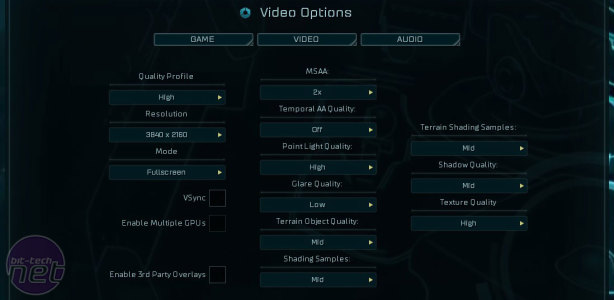Sapphire Radeon RX 470 Nitro OC 4GB Review
Written by Matthew Lambert
August 4, 2016 | 13:58

Ashes of the Singularity
Publisher: StardockThis is effectively the game that introduced the world to DirectX 12, with it offering one of the very first easily repeatable benchmarks. It's a real-time strategy game that features large scale battles with hundreds of units and individual ballistic calculations for every shot. In short, there's a lot going on, and the game is developed specifically to exploit DirectX 12 capabilities like large draw call counts and asynchronous compute (scheduling and executing multiple queues all at once). The game even supports the API's Explicit Multi-Adapter feature, allowing AMD and Nvidia cards to be paired up multi-GPU rendering scenario.
Using the DirectX 12 version, we run the game's built-in benchmark using the 'High' preset, as we've found settings above this to be too extreme. We record the first 30 seconds of the benchmark, as this includes the most challenging part and is representative of the whole thing.
Ashes of the Singularity
1,920 x 1,080, DX12, 'High' settings, 2x MSAA
- EVGA GeForce GTX 1080 FTW 8GB
- Asus GeForce GTX 1070 Strix OC 8GB
- Nvidia GeForce GTX 980 Ti 6GB
- AMD Radeon R9 Fury X 4GB
- Nvidia GeForce GTX 980 4GB
- Nvidia GeForce GTX 1060 Founders Edition 6GB
- Sapphire Radeon R9 390X Nitro 8GB
- AMD Radeon RX 480 4GB
- AMD Radeon RX 480 8GB
- Sapphire Radeon RX 470 Nitro OC 4GB
- Asus GeForce GTX 970 DirectCU Mini 4GB
- Sapphire Radeon R9 380 ITX Compact 4GB
- Palit GeForce GTX 960 Super JetStream 2GB
- Gigabyte GeForce GTX 950 OC 2GB
- Sapphire Radeon R7 370 Nitro OC 4GB
-
-
70
-
103
-
-
-
63
-
90
-
-
-
53
-
83
-
-
-
45
-
89
-
-
-
44
-
66
-
-
-
42
-
65
-
-
-
39
-
71
-
-
-
39
-
62
-
-
-
38
-
62
-
-
-
37
-
60
-
-
-
38
-
54
-
-
-
27
-
46
-
-
-
27
-
39
-
-
-
22
-
32
-
-
-
17
-
27
-
0
25
50
75
100
Frames Per Second
-
Minimum
-
Average
Ashes of the Singularity
2,560 x 1,440, DX12, 'High' settings, 2x MSAA
- EVGA GeForce GTX 1080 FTW 8GB
- Asus GeForce GTX 1070 Strix OC 8GB
- Nvidia GeForce GTX 980 Ti 6GB
- AMD Radeon R9 Fury X 4GB
- Nvidia GeForce GTX 980 4GB
- Sapphire Radeon R9 390X Nitro 8GB
- AMD Radeon RX 480 8GB
- Nvidia GeForce GTX 1060 Founders Edition 6GB
- AMD Radeon RX 480 4GB
- Sapphire Radeon RX 470 Nitro OC 4GB
- Asus GeForce GTX 970 DirectCU Mini 4GB
- Sapphire Radeon R9 380 ITX Compact 4GB
- Palit GeForce GTX 960 Super JetStream 2GB
- Gigabyte GeForce GTX 950 OC 2GB
- Sapphire Radeon R7 370 Nitro OC 4GB
-
-
62
-
93
-
-
-
52
-
76
-
-
-
46
-
69
-
-
-
44
-
79
-
-
-
38
-
55
-
-
-
37
-
64
-
-
-
36
-
54
-
-
-
36
-
53
-
-
-
35
-
53
-
-
-
35
-
52
-
-
-
31
-
45
-
-
-
25
-
39
-
-
-
23
-
32
-
-
-
17
-
25
-
-
-
16
-
23
-
0
25
50
75
100
Frames Per Second
-
Minimum
-
Average










Want to comment? Please log in.